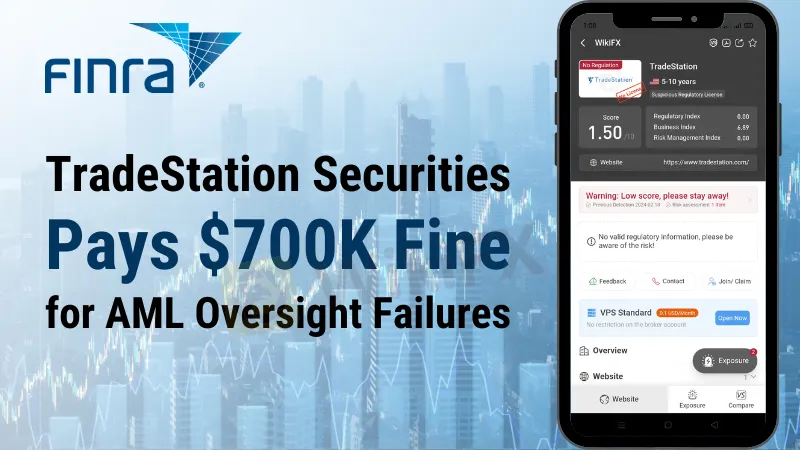简体中文
繁體中文
English
Pусский
日本語
ภาษาไทย
Tiếng Việt
Bahasa Indonesia
Español
हिन्दी
Filippiiniläinen
Français
Deutsch
Português
Türkçe
한국어
العربية
TradeStation Securities Pays $700K Fine for AML Oversight Failures
Abstract:TradeStation Securities fined $700K by FINRA for AML program failures from 2016-2022, highlighting the need for robust compliance in financial trading.

TradeStation Securities, Inc. agreed to pay a $700,000 fine after a settlement agreement with the Financial Industry Regulatory Authority (FINRA). The outcome of the decision is the comprehensive review of the firm's Anti-Money Laundering (AML) practices, which lasted from January 2016 to March 2022.
The main issue in this settlement was TradeStation's failure to design and properly run an AML program capable of detecting illicit trading activity by its clients. Initially, a third-party vendor's automated monitoring system relied heavily on the firm. Between 2016 and 2019, this algorithm generated over 100,000 transaction notifications, averaging 100 alerts each trading day. The enormous number of false positives among these warnings posed a considerable barrier to recognizing true suspicious actions.
The lack of workers designated to monitor these notifications exacerbated the issue. Only two to three compliance analysts, already overburdened with other responsibilities, were entrusted with reviewing these notifications. Their responses to the notifications varied with choices such as rejecting them without further action, giving cautions to customers, banning trading in certain assets, or even canceling customer accounts. However, a fundamental flaw in their methodology was the uneven documentation of their results and conclusions, which proved to be a crucial omission.
Recognizing the need for improvement, TradeStation switched vendors in 2019, seeking to achieve better outcomes. The new strategy reduced false positive alarms, making it more successful. Furthermore, in 2020, in tandem with its business expansion, the company increased its workforce by hiring three additional analysts to help with alert evaluations.

Despite these improvements, the firm's experts did not always flag possibly suspicious trades for additional inquiry. This contradiction was a major vulnerability in TradeStation's AML software. Annual independent AML testing reports in 2016 and 2017 have previously identified these flaws, underscoring the need for better documentation and monitoring of escalated concerns. However, it was not until March 2022 that the firm fully integrated these recommendations into its systems.
TradeStation violated many FINRA standards by failing to consistently escalate certain potentially suspicious trading operations for inspection and by failing to have a well-designed process in place to oversee the evaluation and resolution of alarms. The business specifically breached Rule 3310(a), which governs the implementation of AML systems, as well as Rule 2010, which governs the maintenance of high standards of commercial honor and equitable trading practices. The company also violated FINRA Rule 3110 by failing to create written supervisory procedures (WSPs) for accepting and reselling low-priced securities.
As a result of these findings, TradeStation has accepted a reprimand as well as a substantial $700,000 punishment. This episode emphasizes the vital need for comprehensive and timely AML processes in the financial industry. The intricacies and changing nature of financial trading require ongoing monitoring and agility in compliance processes.
TradeStation's case serves as a strong reminder to other financial institutions of the necessity of complying with regulatory requirements and the need for continual improvements in their AML procedures to maintain the integrity of financial markets and prevent illegal activity.
For more details on this story and daily updates on financial market news, visit WikiFX's news section at https://www.wikifx.com/en/news.html. Stay informed!

Disclaimer:
The views in this article only represent the author's personal views, and do not constitute investment advice on this platform. This platform does not guarantee the accuracy, completeness and timeliness of the information in the article, and will not be liable for any loss caused by the use of or reliance on the information in the article.
Read more

Millions Have Been Lost Due to the Forex Scam! Hope You are Not a Victim!
The black money trail from illegal forex trading activities is deepening its roots across India. Let's find out some latest forex scam stories.

Should You Trade with an 800 Crore Scam-ridden OctaFX?
The Enforcement Directorate accused, OctaFX, a forex trading platform, of an INR 800 crore scam through its investigation. But are ED's claims true? Let's find out!

Markets4you Launches Global Giveaway to Celebrate 18th Anniversary
To mark its 18th anniversary, online trading platform Markets4you has introduced a global promotional campaign, aimed at recognising and rewarding its international client base. The campaign, which runs from 1 April to 30 June 2025, features a range of incentives designed to engage both new and existing users of the platform.

Weltrade: The Broker With Revoked Licences and a Failing Score
With revoked licences, misleading regulatory claims, and a dangerously low WikiScore, Weltrade may be exposing unsuspecting traders to far more risk than they realise. Here’s what every investor needs to know.
WikiFX Broker
Latest News
OctaFX and XM Trading Platforms to Be Blocked in Singapore
ATFX Opens New Office in Cape Town's Portside Tower to Expand in Africa
Tighter Scrutiny: Finfluencers Face Global Crackdown Amid Rising Risks
IronFX: A Closer Look at Its Licences
2025 Broker Real - World Reviews: Share Your Insights & Grab Thousands in Rewards!
Eid ul Adha Celebration Continues – Grab the STARTRADER Offer Now!
Gold Prices Waver as Fundamentals Remain in Tug-of-War
Know the history of "Bank of India" before Investing — then Trade Confidently
AMarkets is an Unregulated Broker | You Must Know the Risks
FCA Warning List is Out: Check if Your Broker is on the List
Currency Calculator


